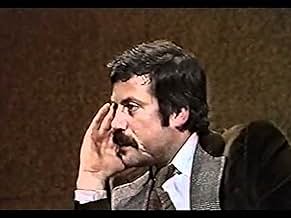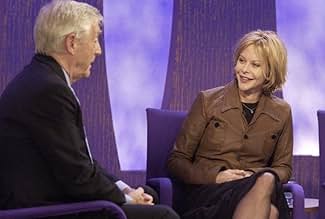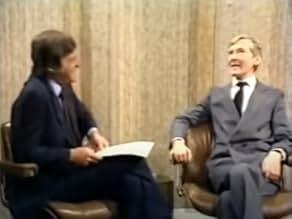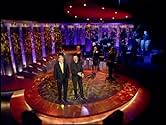Adicionar um enredo no seu idiomaJournalist Michael Parkinson interviews a broad range of the most famous people in the world.Journalist Michael Parkinson interviews a broad range of the most famous people in the world.Journalist Michael Parkinson interviews a broad range of the most famous people in the world.
- Ganhou 1 prêmio BAFTA
- 4 vitórias e 8 indicações no total
Explorar episódios
Avaliações em destaque
The 1970s was the golden age of British television for so many reasons, not least because it was a time when television executives still assumed their viewers were intelligent enough to watch somebody sitting in a chair and speaking at length, without the need for regular interruptions and jokes from the interviewer. Michael Parkinson, unlike today's chat show hosts, was not a comedian, he was a journalist, and his talent was simply for researching his subjects and showing an interest in what they had to say. The remarkable thing about Parkinson was the variety of the guests. His abilities as an interviewer meant that he was able to successfully deal with guests as different as raconteurs (Kenneth Williams, Peter Ustinov), poets (John Betjeman), authors (Leslie Thomas), musicians (Duke Ellington) and scientists (Jacob Bronowski). Parkinson never dominated the show, he was quite happy to let the guests do that. As a result, he gave British television its greatest chat show, a standard that most subsequent chat shows didn't even bother to attempt.
In the 1970s the big stars rarely gave interviews, there were three television channels and no videos, DVDs or Internet. Parkinson had provided a rare opportunity to see these people. Clearly, things could not be the same when, in 1998, the BBC decided to resurrect the series, 16 years since it had ended. A great deal had changed in television over that period. As the 1990s progressed, the talk show increasingly became the domain of comedians as hosts: Jonathan Ross, Clive Anderson, Frank Skinner and Graham Norton. As such, chat shows became more lightweight and more about the host than the guest. Also, with the explosion of the media in the 1980s and 1990s, another effect was the decline in the meaning of celebrity. The revival of Parkinson lasted for nearly ten years but, unfortunately, the show was dying a slow death, with the man all too often having to interview celebrities so minor that you couldn't have made them up in the 1970s: Trinny & Susannah, Simon Cowell, Sharon Osbourne and Gordon Ramsay for examples. As hard as he tried, Parkinson could never convince me that he was as interested in these people as the great stars of the original series. I certainly wasn't.
In fairness, when he had a good guest he was still better than anyone else. One of his greatest abilities was to interview celebrities who are instinctively private and dislike the spotlight on themselves as subjects. He was better than anyone else at making these stars feel comfortable and able to talk, with Rowan Atkinson and Bobby Charlton being prime examples. I actually think that from what I have seen, only his contemporaries David Frost and Melvyn Bragg rival Parkinson in this regard.
Parkinson has now wrapped up his chat show. He has said himself that his show was the last survivor of the talk shows based on conversation. Now, all we have are the comedy shows based on the American format. In some ways it's a shame, in other ways it isn't. Most of the really fascinating stars are now dead or very, very old. Very few modern stars captivate the attention for very long, as Parkinson found in the last few years. Because even Parkinson couldn't make people interesting if they simply weren't.
In the 1970s the big stars rarely gave interviews, there were three television channels and no videos, DVDs or Internet. Parkinson had provided a rare opportunity to see these people. Clearly, things could not be the same when, in 1998, the BBC decided to resurrect the series, 16 years since it had ended. A great deal had changed in television over that period. As the 1990s progressed, the talk show increasingly became the domain of comedians as hosts: Jonathan Ross, Clive Anderson, Frank Skinner and Graham Norton. As such, chat shows became more lightweight and more about the host than the guest. Also, with the explosion of the media in the 1980s and 1990s, another effect was the decline in the meaning of celebrity. The revival of Parkinson lasted for nearly ten years but, unfortunately, the show was dying a slow death, with the man all too often having to interview celebrities so minor that you couldn't have made them up in the 1970s: Trinny & Susannah, Simon Cowell, Sharon Osbourne and Gordon Ramsay for examples. As hard as he tried, Parkinson could never convince me that he was as interested in these people as the great stars of the original series. I certainly wasn't.
In fairness, when he had a good guest he was still better than anyone else. One of his greatest abilities was to interview celebrities who are instinctively private and dislike the spotlight on themselves as subjects. He was better than anyone else at making these stars feel comfortable and able to talk, with Rowan Atkinson and Bobby Charlton being prime examples. I actually think that from what I have seen, only his contemporaries David Frost and Melvyn Bragg rival Parkinson in this regard.
Parkinson has now wrapped up his chat show. He has said himself that his show was the last survivor of the talk shows based on conversation. Now, all we have are the comedy shows based on the American format. In some ways it's a shame, in other ways it isn't. Most of the really fascinating stars are now dead or very, very old. Very few modern stars captivate the attention for very long, as Parkinson found in the last few years. Because even Parkinson couldn't make people interesting if they simply weren't.
Parkinson could be entertaining, but he never had the charm of Johnny Carson in America. But then again, he apparently didn't believe it his job was to make his guests comfortable, but to make them uncomfortable with probing, intrusive questions. He was often paternalistic and disapproving to his female guests, which he defends as being "a man of his time." But I can tell you that women watching back in that time period also found him sexist, as when he asked a young Helen Mirren if her "attributes" (breasts) interfered with becoming a serious actress because they were distracting. I interpreted his different attitude towards women and men as simply his feeling superior to women and being intimidated by the men. One has to wonder if he has a secret hatred of women, he certainly felt he could do whatever he wanted, as the time when he kissed Lauren Bacall full on the lips because HE found her attractive. Parkinson would never be able to have a show in today's world and maybe that's a good thing.
I have just seen a 'Parky' show with the delightful Lesley Garrett. Apart from her marvelous voice, I was amazed at her vivacity and sense of humour. It was entertainment at it's best. Lesley was introduced as styling herself more like Gracie Fields than Maria Callas ... I'm sure she is truly loved for being herself.
If it wasn't for this type of show (and Parkinson show is the best of this genre) One would never see the other side of some of these celebrities, and we would be poorer for it.
It seems some people don't like the Parkinson show, these few people shouldn't watch it, especially when their jealousy for Parkinson's popularity shows so much.
If it wasn't for this type of show (and Parkinson show is the best of this genre) One would never see the other side of some of these celebrities, and we would be poorer for it.
It seems some people don't like the Parkinson show, these few people shouldn't watch it, especially when their jealousy for Parkinson's popularity shows so much.
Michael Parkinson recently moved his chat show from BBC1 to ITV as BBC1 had offered him an earlier evening slot which he refused and ITV had no problem screening it at similar times as on BBC1. It is now usually shown at around 10 to 11:15 pm on Saturdays.
He has interviewed many stars over the years including some of the biggest names in Hollywood. Some of these stars include Michael Caine, Jimmy Tarbuck, John Wayne, Bruce Forsyth, Cilla Black, Julie Walters, Bruce Willis, Anne Widdecombe, Will Smith, Samual L Jackson and Kenneth Williams. One actor I'm surprised he has not interviewed yet is Leonardo DiCaprio, but there is time yet.
I quite enjoy watching Parkinson on Saturdays, even though sometimes he has guests on that I have never heard of. Certainly better than Johnathan Ross's Friday chat show.
Long may Parky be chat show king.
He has interviewed many stars over the years including some of the biggest names in Hollywood. Some of these stars include Michael Caine, Jimmy Tarbuck, John Wayne, Bruce Forsyth, Cilla Black, Julie Walters, Bruce Willis, Anne Widdecombe, Will Smith, Samual L Jackson and Kenneth Williams. One actor I'm surprised he has not interviewed yet is Leonardo DiCaprio, but there is time yet.
I quite enjoy watching Parkinson on Saturdays, even though sometimes he has guests on that I have never heard of. Certainly better than Johnathan Ross's Friday chat show.
Long may Parky be chat show king.
I don't blame Meg Ryan for being upset with the lousy job the surgeon did on her mouth and the break up of her marriage, but it's not the British audience's fault. If she is anything of an actress she could at least have acted as if she was gracious and intelligent.
She came across as a wannabee intellectual snob without an intellect to be snobbish about.
She came across as a wannabee intellectual snob without an intellect to be snobbish about.
Você sabia?
- CuriosidadesThe first series of the show, including interviews with John Lennon, Yoko Ono, Peter Ustinov, Benny Goodman, Spike Milligan and Orson Welles, was wiped on the orders of a BBC committee. All that survives of the first series is a monochrome telerecording of his interview with Shirley MacLaine.
- ConexõesEdited into Heroes of Comedy: Terry-Thomas (1995)
Principais escolhas
Faça login para avaliar e ver a lista de recomendações personalizadas
- How many seasons does Parkinson have?Fornecido pela Alexa
Detalhes
Contribua para esta página
Sugerir uma alteração ou adicionar conteúdo ausente




































